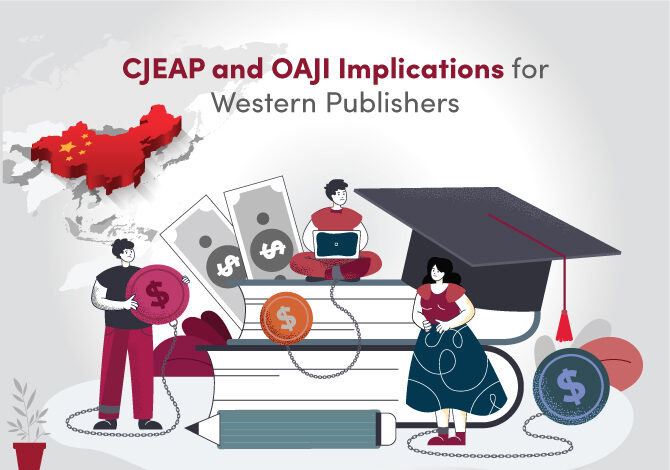The China Journal Excellence Action Plan and the Open Access Journal Index represent significant strategic initiatives from China aimed at bolstering the quality and global impact of its academic publications. These developments have wide-reaching implications for Western publishers and global scholarly collaboration, as they challenge established norms and power structures within scholarly publishing.
At this year’s Frankfurt Book Fair, MPS sponsored a talk that addressed these initiatives as well as the resulting challenges that Western Publishers will face. Helen Tian, General Manager of our China office, explores how China is rapidly advancing STM journal quality and impact through China’s STM Journal Excellence Action Plan. She was followed by Ting Yue, from the Chinese Academy of Sciences, who discussed the Open Access Journal Index and the goal to promote the healthy development of a global OA ecosystem.
Watch Recording
As you listen to Helen and Ting, I want you to think about how you and your organization will address the following:
- Increased Competition for Western Publishers
The China Journal Excellence Action Plan, which seeks to elevate the quality of Chinese journals to global standards, is directly aimed at positioning these journals as major players on the international stage:
- With government support, Chinese journals are receiving more resources to improve editorial standards, peer review processes, and overall journal quality. This could lead to a shift in submission patterns as Chinese researchers may prefer to publish in domestic journals that have gained global recognition. Western publishers, who traditionally attract high-quality submissions from Chinese researchers, may need to adapt their strategies to maintain their share of these valuable contributions.
- With the creation of the Open Access Journal Index, China aims to make its journals more discoverable and accessible globally. This increases the visibility of Chinese research and directly competes with Western publishers who have historically enjoyed dominance in the indexing of high-impact research.
- Shift Towards National Publishing Power
The Chinese government’s investment demonstrates its desire to consolidate more scholarly publishing power within China. This move could reduce Chinese dependence on Western publishing systems and challenge Western publishers’ dominance in certain disciplines.
- As Chinese journals become more visible and indexed internationally, they will attract not only Chinese researchers but also international scholars. Leading to a re-balancing of academic influence, especially in key fields like engineering, technology, and the natural sciences, where China is already a leader in research output.
- The Open Access Journal Index allows wider dissemination of research without paywalls. This aligns with global trends but also positions China as a leader in the Open Access movement.
- Implications for Global Collaboration
China’s efforts to improve its journal ecosystem could either foster more global collaboration or increase fragmentation in the scholarly publishing world.
- As Chinese journals improve their quality and expand their reach, Western publishers could find opportunities for collaboration. This could involve co-publication agreements, joint editorial efforts, and shared Open Access platforms.
- Conversely, if Chinese journals become highly competitive and attract a significant share of Chinese and even global research, Western journals might see a decrease in submissions from Chinese researchers. Creating regional silos, potentially limiting cross-pollination of ideas.
- Pressure to Adopt Open Access Models
The Open Access movement aligns with global trends but is still being debated in Western publishing circles, particularly around issues of funding and sustainability.
- Many Western publishers rely heavily on subscription-based models, which are increasingly at odds with the Open Access movement. With China rapidly advancing Open Access, there will be more pressure on Western publishers to adopt sustainable Open Access models where neither the author nor the reader pays fees.
- Western publishers must address the ethical concerns surrounding high Article Processing Charges (APCs), which can exclude researchers from less affluent regions.
- Need for Enhanced Indexing and Metadata Standards
- Western publishers may need to collaborate with Chinese institutions to integrate Chinese journals into global indexing systems like Scopus, Web of Science, and PubMed.
- Working with cross-industry initiatives like CrossRef and ORCID to streamline metadata protocols will help ensure that research from all regions remains discoverable and accessible across multiple platforms.
- Strategic Focus on Multilingual Publications
Western publishers may need to consider offering more multilingual publications or translation services to cater to the growing Chinese market.
- Western publishers could consider offering translation services for accepted papers or publishing dual-language journals, particularly in fields where Chinese research is most prominent. This approach could help bridge the gap between Chinese researchers and international audiences, ensuring that important research is accessible in both English and Mandarin.
The China Journal Excellence Action Plan and Open Access Journal Index signal China’s intent to play a more dominant role in the global scholarly publishing ecosystem. I feel very strongly that it is the responsibility of both scholarly publishers and institutions to prevent the fragmentation of scholarly communication. Western publishers must continue to engage with Chinese researchers and publishers, finding innovative ways to partner and share knowledge across borders. This global approach will not only benefit both regions but will also ensure that the advancement of science and research continues to be a collective, international endeavor.
– by Tony Alves



